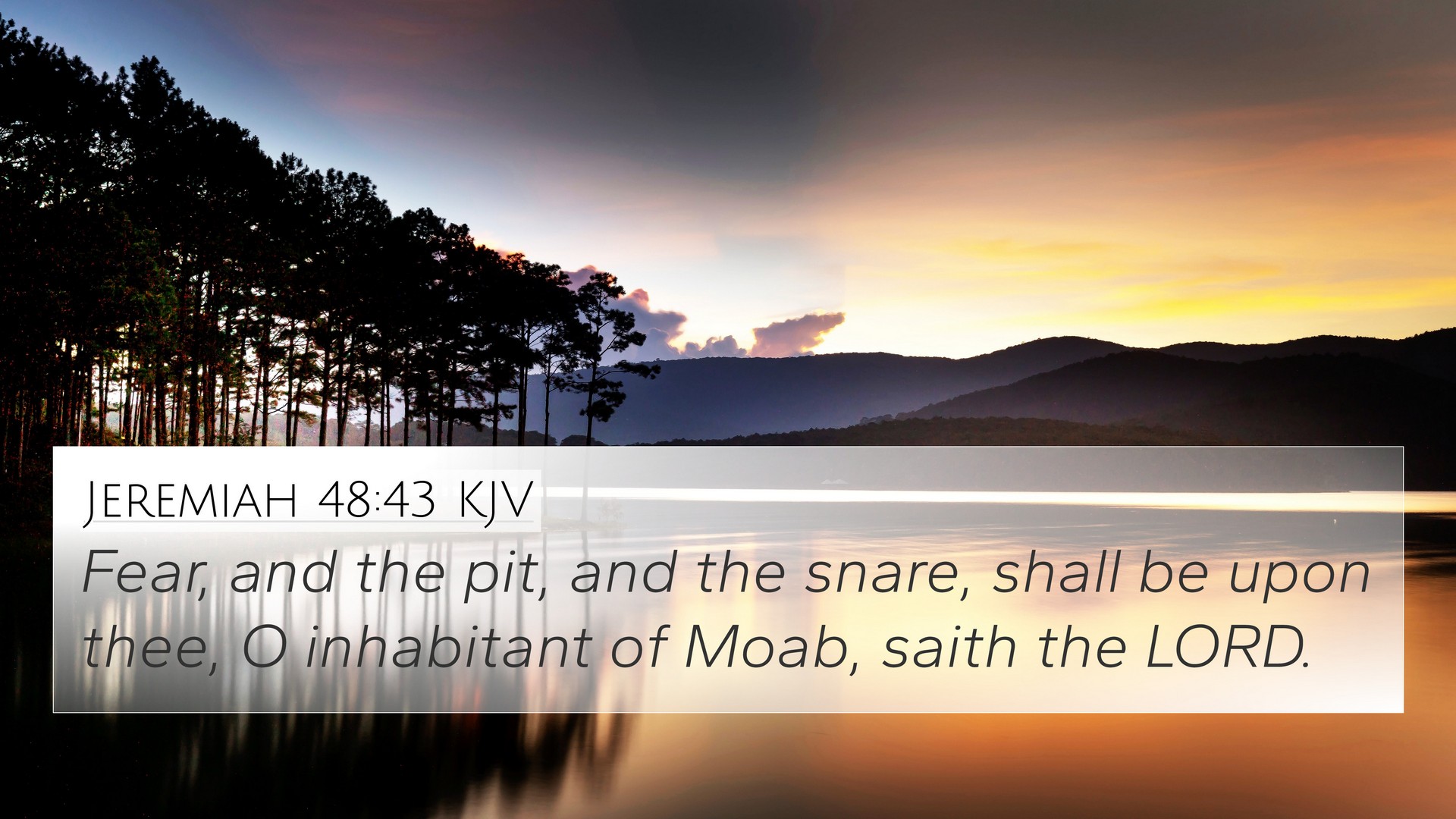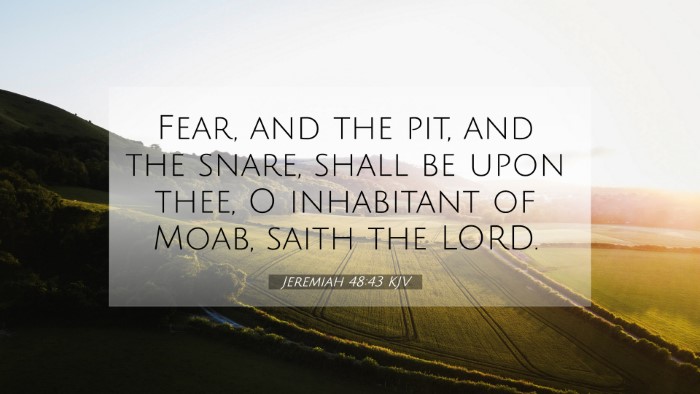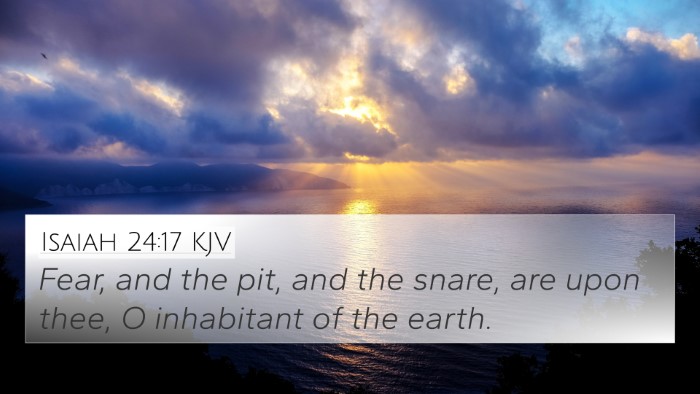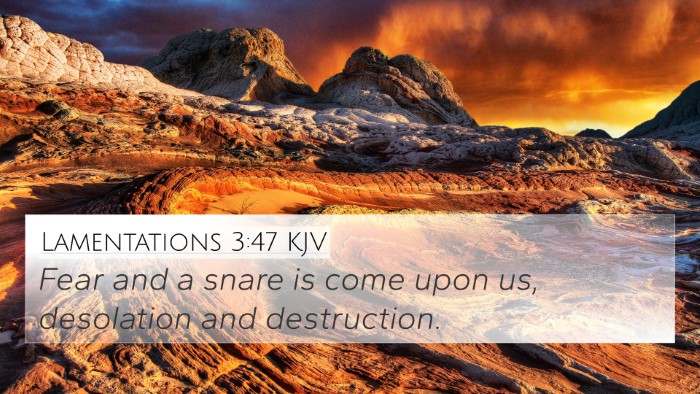Understanding Jeremiah 48:43
Verse: Jeremiah 48:43 - "Fear, and the pit, and the snare shall be upon thee, O inhabitant of Moab, saith the Lord."
This verse speaks vividly about the impending judgments upon Moab, emphasizing the fear and destruction that will come as a result of their unfaithfulness and pride.
Summary of Insights from Public Domain Commentaries
Commentators such as Matthew Henry, Albert Barnes, and Adam Clarke provide rich insights into the meaning of this verse. Here we combine their interpretations to provide a comprehensive understanding.
-
Matthew Henry:
Henry highlights the severity of God's impending judgment on Moab, reflecting God's displeasure with their actions and their refusal to repent. He notes that the "fear, pit, and snare" symbolize the totality of Moab's destruction, which will be inevitable due to their transgressions.
-
Albert Barnes:
Barnes focuses on the figurative language in the verse. The "fear" represents the psychological torment that Moab will face as judgment approaches. The "pit and snare" symbolize physical traps leading to death and devastation, illustrating the planned and certain doom for Moab's inhabitants.
-
Adam Clarke:
Clarke adds that the mention of "inhabitant of Moab" indicates that no one will escape the judgment. He draws connections to past judgments to illustrate God's unwavering justice towards nations that stray from His commands, tying it back to the broader theme of divine retribution in the Old Testament.
Thematic Connections and Cross-References
This verse does not exist in isolation but engages in an inter-biblical dialogue, with several verses that parallel its themes of judgment and retribution:
- Isaiah 15:1: "The burden of Moab. For in a night, Ar of Moab is laid waste, and brought to naught." - This provides a direct prophecy against Moab, echoing Jeremiah's warnings.
- Ezekiel 25:8-11: Discussing how Moab shall face judgment for their contempt toward God’s people.
- Amos 2:1: "Thus saith the Lord; For three transgressions of Moab, and for four, I will not turn away the punishment thereof..." - Acknowledges the accumulation of sin leading to inevitable punishment.
- Zephaniah 2:8-10: Highlights the coming destruction of Moab and their false security.
- Jeremiah 49:1-4: Delving deeper into Moab's fate, illustrating its eventual doom.
- Micah 4:10: A prophetic warning and assurance that God’s word brings powerful consequences.
- Matthew 10:29: "Are not two sparrows sold for a farthing? and one of them shall not fall on the ground without your Father." - While focused on God’s awareness of even small creatures, it underscores divine oversight regarding judgment.
The Significance of Cross-Referencing in Biblical Study
Using a Bible concordance or Bible cross-reference guide can greatly enhance one's understanding of verses such as Jeremiah 48:43. By exploring connections between Bible verses, one can gain insight into the overarching themes of judgment and divine justice.
Tools for Cross-Referencing
- Comprehensive Bible cross-reference materials: These resources help identify links between various scriptures.
- How to use Bible cross-references: It's essential for deeper studies and sermon preparations.
- Bible chain references: This method connects related themes across different books.
- Cross-referencing Bible study methods: Utilizes thematic elements for meaningful discussions.
Applying the Teachings of Jeremiah 48:43
When studying Jeremiah 48:43 and its ramifications, believers can reflect on the nature of God’s justice and the importance of turning away from sin. The multi-faceted approach to understanding this verse encourages an exploration of not only the immediate context but also how it resonates with inter-Biblical dialogue and parallels.
In conclusion, the verse serves as a sobering reminder of the consequences of unrepentant sin and the hope of redemption through adherence to God's will. Utilizing techniques from Bible cross-reference systems can deepen understanding and application of these scriptures in personal faith journeys.






